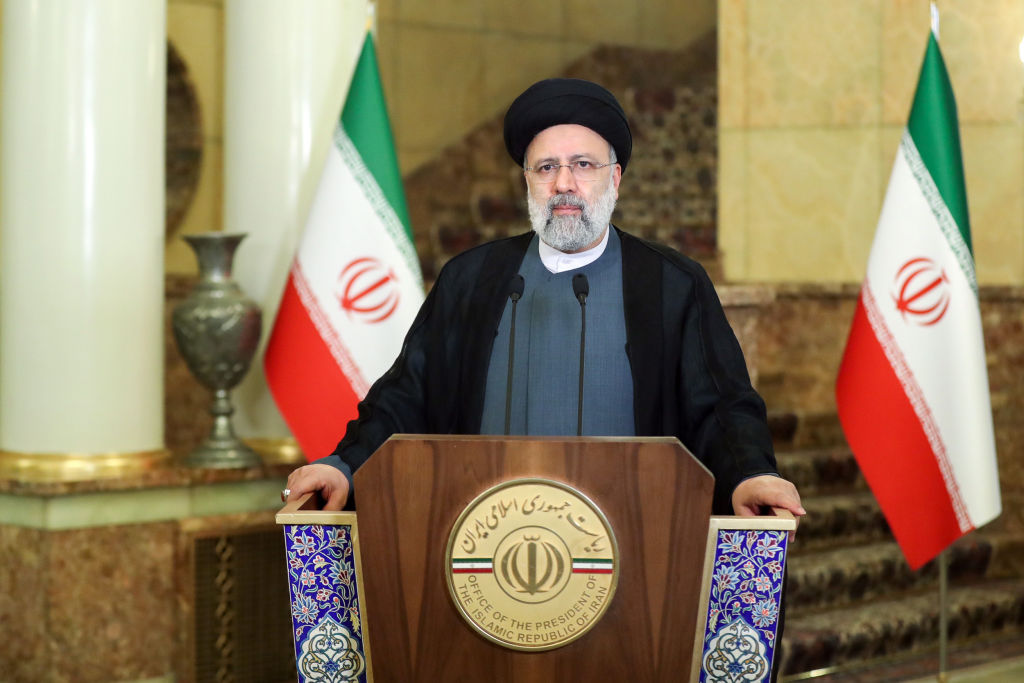
The U.S. and Iran are moving closer to confrontation. In 2015, Iran signed a deal with the U.S., Britain, France, Germany, Russia and China to limit its nuclear production in exchange for the lifting of sanctions that have crippled the nation’s economy. In 2018, former President Donald Trump kept a campaign promise to pull the U.S. out of the agreement, and Iran again ramped up its nuclear activity. President Joe Biden pledged to try to restore the deal, but Iran—reluctant to negotiate from a perceived position of weakness, and angry that U.S. presidents can so easily reverse their predecessors—is playing hard to get.
Iran’s government has said at various times that it wants to revive the deal, and the country’s new president, Ebrahim Raisi, entered office in August with a chance to seal a quick agreement with Washington. He would have had to accept limits on what Iran insists is a peaceful nuclear—energy program, but the lifting of sanctions would allow Iran to sell much more of its oil and other exports, helping to rebuild its broken economy. Instead, Iran has ramped up its nuclear program in ways that reduce the “breakout time” needed for it to build a nuclear weapon, and Raisi has offered little at the negotiating table.
Diplomacy is now on hold, and prospects for success are fading. The Biden Administration has few options. The chaotic withdrawal from Afghanistan has reduced the President’s tolerance for risk-taking with Iran that will invite Republican charges of appeasement. Israel, which speaks of Iran’s nuclear program as an existential threat, fears that Biden’s foreign policy focus on China and his determination to pivot America’s security focus toward Asia will leave Israel alone, while America’s Gulf allies are more concerned about Iran’s proxy wars and cyber-threats.
The fight over the nuclear program could have spillover implications for both nations and the region. As hopes of reviving the nuclear deal fade, Iran will insist on a more limited agreement. To try to force that result, Iran will accumulate more highly enriched uranium, deploy more advanced centrifuges and test techniques for turning uranium into metal that can be used to make a bomb. As the Biden Administration works with allies to dial up more economic pressure, Iran may again remind the world that it can strike shipping in the Persian Gulf.
There’s also a risk inside Iran that continued economic misery will provoke anti-government protests, and if Raisi doesn’t believe he should offer the nuclear concessions needed to ease that pain, he may instead create distractions in the various Middle East conflicts in which Iran is directly or indirectly involved—particularly in Iraq and Yemen. Fear of U.S.–Israeli strikes inside Iran that his government can’t effectively respond to will prevent Raisi from crossing the ultimate red line by building a bomb. Nor is Iran likely to repeat its bold 2019 attack on Saudi oil infrastructure, at least for now. But Iran’s hard-line President has many options short of that, which could again raise security alerts and add upward pressure on already high and rising oil prices.
There is also a continuing risk that Israel will decide it must take military action to stop Iran, with or without a nod from Washington. More likely is the less drastic, but still dangerous, step of Israeli sabotage of Iranian nuclear and military sites, which will provoke Iranian retaliation, including in cyberspace. Miscalculation on either side could provoke a spiraling conflict.
The new presidents of the U.S. and Iran are both playing weak hands, and that’s making it unexpectedly hard to restore a deal that offers big benefits for both sides.
More Must-Reads from TIME
- Inside Elon Musk’s War on Washington
- Meet the 2025 Women of the Year
- The Harsh Truth About Disability Inclusion
- Why Do More Young Adults Have Cancer?
- Colman Domingo Leads With Radical Love
- How to Get Better at Doing Things Alone
- Cecily Strong on Goober the Clown
- Column: The Rise of America’s Broligarchy
Contact us at letters@time.com